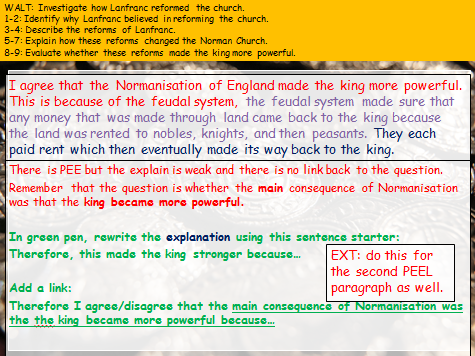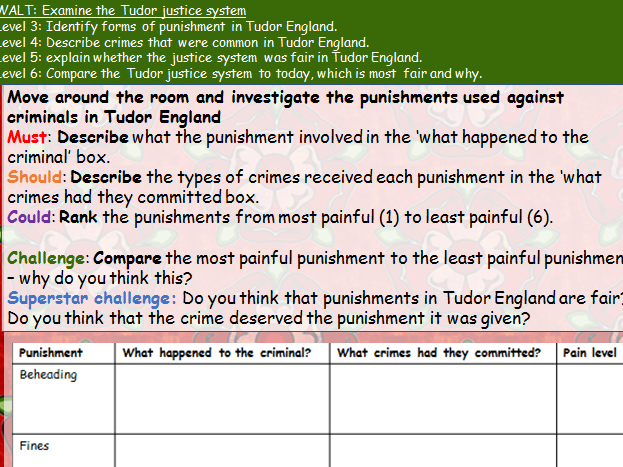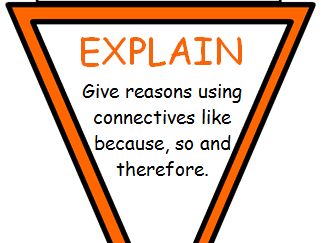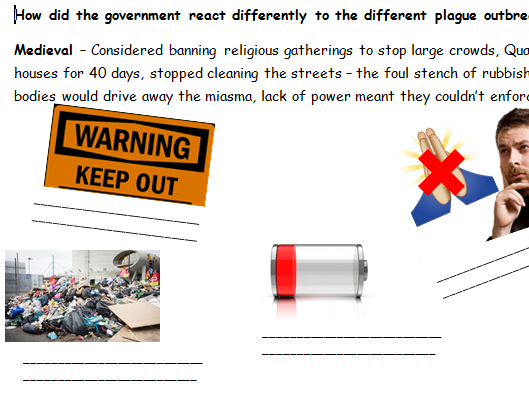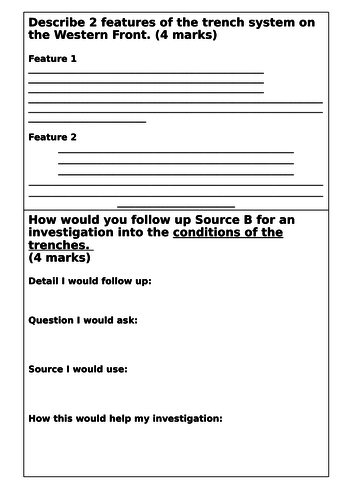
177Uploads
70k+Views
23k+Downloads
History

Lanfranc's reforms with exam skills (Edexcel history 9-1)
Pupils explore Lanfranc’s reforms before analysing an exam response to the 16 mark question on the Norman’s paper.
Pupils mark the answer using a simplified mark scheme before improving a paragraph and then writing their own about Lanfranc and whether his reforms made the king more powerful. Encourages pupils to familiarise themselves with PEEL paragraphs and focus on applying these skills and using words from the question to ensure their explanation is analytical enough for a level 3-4 answer.

Trench Medicine WW1
Pupils explore the problems soldiers, nurses and doctors faced as well as analysing the advances in medicine that helped soldiers overcome problems like trench fever, shell shock and shrapnel wounds.
Pupils analyse sources before completing a carousel and then making a leaflet advising a soldier about how best to protect themselves on the western front.

Tudor Crime and Punishment
This is a lesson aimed at KS3, it provides an overview of crime and punishment in Tudor times.
Pupils complete a carousel around the room in order to analyse the punishments that people received for certain crimes.
They then decide which punishments the criminals deserve (Anne Boleyn and Thomas Cromwell included) before comparing whether the Tudor justice system is fair with today’s justice system.

Command word display
Bunting that includes command words for the new specification:
identify, describe, explain, define, recall, evaluate, infer, compare, evaluate

Henry VIII: Great Matter and Break with Rome
Lesson that analyses the reasons for the Break with Rome and the impact this had on England, pupils explore the topic through video and a spot the difference task in which they consider the difference between a catholic and protestant church.
Pupils are asked to consider why Henry himself did not become a Protestant.
WALT: Explore how the Great Matter led to the establishment of the Protestant church.
Level 3: Identify key words that we will use today.
Level 4: Describe the Great Matter and the Break with Rome.
Level 5: explain the difference between Catholic and Protestant churches.
Level 6: Assess why Henry chose not to be christened as a Protestant.

Henry VIII Wives
Full lesson and homework. Pupils evaluate which wife Henry loved most by firstly completing a carousel activity that allows them to explore each wife and the reasons Henry divorced her before creating an extended writing piece (differentiated) about who he loved most.
Homework: to write a letter to the Pope explaining why you want a divorce from Katherine of Aragon.
WALT: Evaluate who Henry loved most.
Level 3: Identify Henry’s six wives.
Level 4: Describe each of his wives and what happened to them.
Level 5: explain why Henry divorced each wife.
Level 6: Compare which wife was Henry loved most, give reasons why.

Who was Henry VIII?
Introductory lesson for Henry the Eighth. Pupils compare reasons Henry is remembered as a good and a bad king to come to a conclusion as to how they think he should be remembered.
Pupils also answer an interpretation question - training for the new GCSE reforms.
WALT: Explore the type of king Henry VIII is remembered as.
Level 3: Identify what makes a good king.
Level 4: Describe the type of person Henry VIII was.
Level 5: explain how features of Henry’s personality made him a good king.
Level 6: assess the main difference between two interpretations.

Why Enlist - Propaganda in WW1
Lesson that introduces pupils to the concept of propaganda, pupils complete a carousel in which they analyse posters and how they would make them feel. They evaluate how likely they would have been to join the army and then analyse how useful a fictional soldiers account of why he joined the army is (preparation for GCSE edexcel how useful question).

Early Modern Medicine Homework (Edexcel history 9-1)
Collection of differentiated exam quesions and exam based skills work to allow pupils to develop learning outside of school.

Renaissance Medicine Homeworks (Edexcel history 9-1)
Selection of homeworks to support pupils outside of their lessons, mixture of consolidating knowledge and exam questions. All fully differentiated to aid progress.

Medieval Medicine Homeworks (Edexcel history 9-1)
Explain, How far do you agree and overview homework to support learners with development of exam skills and knowledge outside of the classroom.

WW1 Medicine in the Trenches homework (Edexcel history 9-1)
Free resources, homework for pupils to support the Edexcel 9-1 medicine through time paper.

Titanic - who was to blame?
Group lesson, pupils work in groups to analyse sources which help them decide who was to blame for the disaster - they annotate each source before moving onto the next.
At the end of the lesson pupils are asked to evaluate who was most to blame, this task is levelled with different tasks for each attainment level.

Introduction to WW1 - distribution of power in 1914
Pupils evaluate the power of each country by analysing whether they have an army, money, empire and any other relevant information.
They then argue why they think their country is the most powerful and get into a ‘living line’ from most to least powerful. They must then defend their decision.
Leads into a lesson regarding long and short term causes of WW1 including the assassination of FF.

Submission of the Earls 1066 - Normans (Edexcel history 9-1)
Whole lesson, fully differentiated with worksheets.
The final task asks pupils to compare answers against success criteria to mark and then improve two weak 16 mark answers,

Extermination of the Buffalo (American West (Edexcel history 9-1))
Whole lesson exploring the reasons for and impacts of the extermination of the buffalo.
Includes carousel task and exemplar answers that pupils are asked to compare and improve.

Wounded Knee and Ghost Dance (American West (Edexcel history 9-1))
Whole lesson covers the ghost dance and the massacre at wounded knee.
Lesson fully differentiated with the opportunity for discussion as to why the Ghost dance would terrify white settlers and how they reacted to the massacre.

Battle of Little Bighorn; causes, conduct, consequences (American West (Edexcel history 9-1))
Complete lesson on the Battle of Little Bighorn including exam skills work around the 8 mark importance question - pupils are asked to mark and improve a model answer.

Sand Creek Massacre and Red Cloud's War (American West (Edexcel history 9-1))
Lesson that analyses the causes, conduct and consequences of Sand Creek and Red Cloud.
Includes opportunity for pupils to analyse the success of President Grant’s Peace Treaty.
Pupils complete a narrative account and work in pairs to gain information about the two events .

